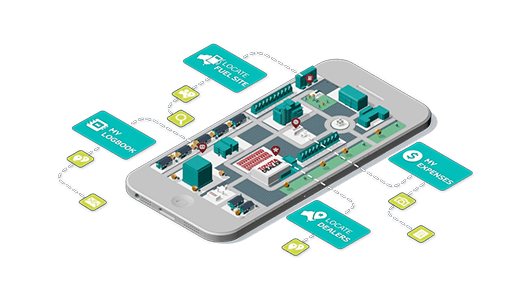Just Imagine, two decades ago, if someone were to say, you will have a device that unlocks on your fingerprint or face recognition. This device won’t just let you call from one side of the world to another but also allow you to see them. Music, Radio, Video, Calculator, Alarm, Calendar, Games, and Whatnot! It can even bring food for you or give your exact location to someone if you’re ever lost in this ever-busy world.
With the entry of the Internet of Things, Artificial Intelligence and the Cloud storage, the possibilities of future technology are endless.
![]()
Such a massive change in our daily life is truly unbelievable. But, it’s all happening, right? Now let’s go back to the ”It can give your exact location”. So, what exactly is this and how does it happen? Most of us are familiar with the term, ‘GPS’, ‘GPS tracker’.
So, what exactly is GPS Vehicle Tracker?
Let’s start with what GPS Stands for – “Global Positioning System”. In technical language, “GPS provides geolocation and time information to a GPS receiver in all weather conditions, anywhere on or near the Earth where there is an unobstructed line of sight to four or more GPS satellites.” Now, that we’re aware of what it does, let’s brief ourselves with how this effects things around us.
As I was talking about the evolution of technology, one of the biggest growths was seen in “Vehicles”.
- As of now, there are more than 1 billion cars currently in use on earth.
- And about 165,000 cars are produced every day.
Now, this was just about cars, and we certainly know there are a lot more other vehicles around. Due to this tremendous growth, managing them all became tiresome and rather complicated too.
 In order to deal with these complications, ‘Fleet Management’ was introduced. The ‘Fleet’ here literally stands for ‘Vehicle’.
In order to deal with these complications, ‘Fleet Management’ was introduced. The ‘Fleet’ here literally stands for ‘Vehicle’.
Why we need Fleet Management?
We will be focusing on the Commercial Motor Vehicles which consists of Cars, Vans, and Trucks. The purpose of introducing a fleet management system was to eradicate the problems faced by drivers and owners of the vehicles.

These problems include areas of vehicle financing, vehicle maintenance, vehicle telematics (tracking and diagnostics), driver management, speed management, fuel management, and health and safety management. Now one question arises how do the companies benefit from the Fleet Management services.
- The Fleet Management works to remove or minimize the risks associated with the industry. This includes vehicle investment, improving efficiency, productivity and reducing their overall transportation and staff costs, providing 100% compliance with the duty of care and many more.
- The services have proven to be so fruitful that within a span of 5 years, Fleet Management has seen a mighty growth from 3.05 million units in 2012 to 6.40 million in 2017 in the European Markets.
The Function of Fleet Management includes –

- GPS Vehicle tracker
- Mechanical diagnostics
- Driver behavior
- Fleet management software
- Fleet security and controls.
This concludes the Introduction on Fleet Management and Evolution of Technology in Vehicles. We will cover the functions of Fleet Management in detail in the next article on the Fleet Management series.











